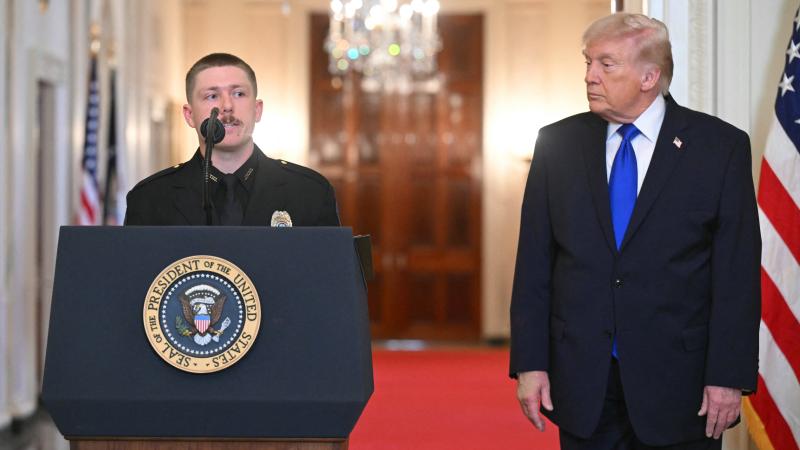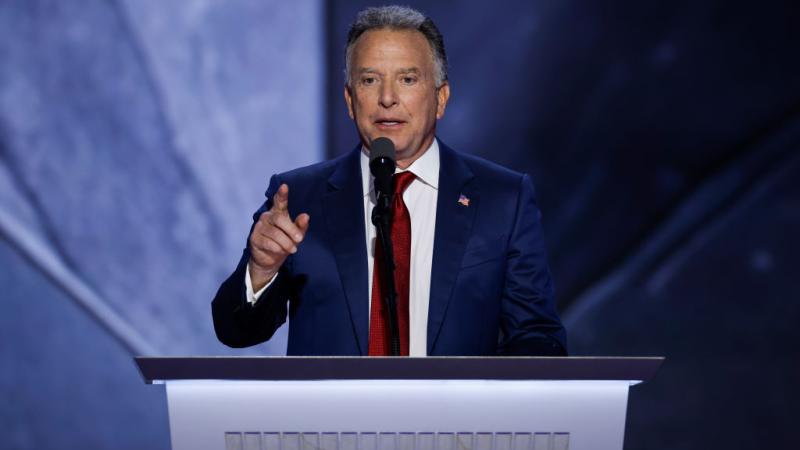Hunter Biden faces contempt of Congress, and a history of penalties and prejudices
Previous prosecutions of Trump advisors show the severe penalties that come with being held in contempt of Congress, though history shows that Democratic control of the Department of Justice may shield Hunter Biden from meaningful consequences.
The House Oversight Committee is moving forward with a resolution to hold Hunter Biden in contempt of Congress at a hearing scheduled for Wednesday, diving into a process with an uneven history of penalty and perceived prejudice.
The move marks the latest in an effort to secure the testimony of Hunter Biden in the impeachment inquiry that House Republicans launched last year into his father, President Joe Biden.
So far, the younger Biden has resisted appearing for his closed door deposition with the House Oversight Committee, which teed up the subpoena fight. Contempt powers are the remedy that the Constitution provides for the legislative branch to enforce its oversight powers. Traditionally, initial depositions before Congressional subcommittees are held behind closed doors before that testimony is released or replicated in public.
But Hunter Biden's lawyers told the House Republicans on the Oversight and Judiciary committees that he was willing to testify by the Dec. 13 deadline – but only if he can do so publicly. House Republicans are insisting they want to talk to him behind closed doors first. "He does not get to dictate the terms of this subpoena," Comer told CBS News, adding that "We will not provide special treatment because his last name is Biden."
The procedure used in the Oversight Committee's investigation is the same set by other congressional probes, including that of the Jan. 6 House select committee and the first impeachment proceedings against former President Donald Trump. In those cases, depositions were taken first as a fact-finding exercise before any public testimony. Republicans have said they are holding Hunter Biden to the same standard.
The history of the inherent contempt powers extend all the way back to the founding of the United States. Recently, Congress has devised two methods to hold individuals in contempt, rather than using its inherent powers to compel an individual to testify through its own power. The first of these methods is being used to enforce its subpoena against Hunter Biden.
Some Democrats have criticized the House Republicans’ subpoena and threats to hold Hunter Biden in contempt, yet recent history shows that Democrat-run committees made full use of congressional subpoena powers to compel testimony in their investigations—even holding former Trump advisors Steve Bannon and Peter Navarro in contempt when they failed to comply with a subpoena from the Jan. 6 Committee investigating the riot at the Capitol.
Abbe Lowell, lawyer for Hunter Biden, did not respond to a request for comment from Just the News.
In the case of both former Trump advisors Bannon and Navarro the Justice Department aggressively pursued charges of Contempt of Congress against them and both were convicted. Bannon is currently appealing his conviction and Navarro is yet to be sentenced.
Throughout American history, Congress routinely used powers granted directly by the Constitution to enforce legislative subpoenas and prevent obstruction of their agenda. According to the Congressional Research Service (CRS), the inherent contempt power permits each house to arrest and detain an individual who is found to be be obstructing Constitutionally defined duties and responsibilities of the legislature, as the Supreme Court ruled in Marshall v. Gordon (1917) and reiterated in Eastland v. United States Servicemen's Fund in 1975.
The CRS notes that the Supreme Court has determined that “some means of compulsion [is] essential for Congress “to obtain what is needed.” When Congress finds an inquiry blocked by the withholding of information, or where the traditional process of negotiation and accommodation is considered inappropriate or unavailing, a subpoena—either for testimony or documents—may be used to compel compliance with congressional demands."
The inherent contempt powers were last used in 1934 when the Senate arrested lawyer William MacCracken Jr., a former Assistant Secretary of Commerce, who was cited to appear before Congress. The Supreme Court upheld Congress’ expansive power to enforce its own oversight capabilities when MacCracken challenged his arrest and detention.
Today, Congress mainly enforces its subpoenas through criminal contempt referrals and civil enforcement. Each of these methods requires a second branch of government to enforce the congressional subpoena, the Executive and Judicial branches, respectively.
It is the first option, a contempt referral to the Department of Justice, that House Republicans are pursuing against Hunter Biden. According to federal law promulgated in 1857 and reenacted in 1938, the failure to comply with a congressional subpoena is a criminal offense, and the relevant house of Congress can hold the offender in contempt and refer the matter to the DOJ for prosecution. This is the option that House Republicans are employing at the moment to compel Hunter Biden’s testimony.
The two most recent examples of Bannon and Navarro provide a roadmap used by the Democrat-established Jan. 6 Select Committee that was implemented to investigate the Capitol riot and the Trump Administration’s actions on that day.
Bannon—who served as an advisor to President Trump until August 2017—was subpoenaed on Sept. 23, 2021 to appear before the Jan. 6 Committee because it believed that he had relevant information pertaining to the events of that day.
Bannon was ordered to appear for a deposition before the committee on Oct. 14, 2021 and to turn over any documents related to the committee’s requests, according to the DOJ. Bannon did not appear at his scheduled deposition, citing executive privilege and advice of counsel. The doctrine of executive privilege defines the President’s authority to withhold documents or information from the Legislative or Judicial Branches. Though not mentioned in the Constitution, the Supreme Court has held that executive privilege is inherent in the separation of powers.
Bannon was subsequently indicted by the DOJ on two counts of contempt of Congress and convicted on those charges in October 2022. A judge sentenced him to four months in prison. A federal appeals court in Washington, D.C. is currently considering his appeal to overturn the conviction and sentence.
Bannon faces a separate trial this May after he was indicted for money laundering, conspiracy, and fraud, among other things, related to a fundraising push called “We Build the Wall” in which prosecutors allege he misrepresented the purpose of the fundraiser to donors and used the money to enrich himself and others involved in it.
Former Trump advisor Peter Navarro was also subpoenaed by the Jan. 6 Committee to appear and produce documents for the committee as part of its investigation. Navarro had attempted to use the same defense as Bannon, that President Trump had invoked executive privilege, and so he could not respond to the committee’s requests.
Navarro was indicted on two counts of contempt of Congress on June 2, 2022 and his sentencing hearing is schedule to take place next week. Each count carries a minimum of 30 days or a maximum of one year in jail, and a fine up to $100,000, according to the Justice Department.
Yet, the Oversight Committee’s efforts to secure Hunter Biden’s testimony may hit a roadblock because both Bannon’s and Navarro’s prosecution by the DOJ occurred during Democratic control of both the executive branch and Congress. In modern history, when a witness is found in contempt of congress under an administration of an opposing party, the DOJ has asserted a right to exercise discretion about whether or not to prosecute and charges are rarely brought.
This was highlighted in the case of Obama’s Attorney General Eric Holder in 2012. When Holder refused to comply with a House Oversight Committee subpoena to provide documents related to the “Fast and Furious” operation, the committee held him in contempt and referred the matter to the DOJ. The DOJ responded to the referral, refusing to act on it citing prosecutorial discretion and eventually declining to challenge Holder's claim of executive privilege.
This fact may force the House Oversight Committee to pursue alternative means of enforcement, especially if the Justice Department exerts such a privilege if and when the House forwards the contempt resolution.
The Facts Inside Our Reporter's Notebook
Links
- House Oversight Committee said in a statement
- Contempt of Congress
- but only if he can do so publicly
- Some Democrats
- have criticized
- Supreme Court ruled in Marshall v. Gordon
- reiterated in Eastland v. United States Servicemen's Fund
- last used
- mainly enforces its subpoenas
- until August 2017
- citing executive privilege
- doctrine of executive privilege
- convicted on those charges
- currently considering
- indicted for money laundering, conspiracy, and fraud
- attempted to use the same defense
- indicted on two counts
- Fast and Furious
- DOJ responded
- challenge Holder's claim of executive privilege
















